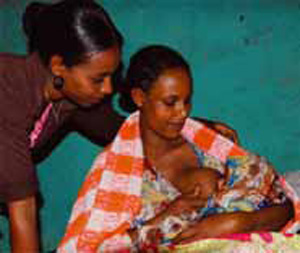2.1.7 Breasts and initiation of lactation
Another important event that happens soon after the birth is the initiation of lactation, that is the production of colostrum and then milk by the breasts, and the release of these nutritious fluids when the baby suckles the mother’s nipple. The breasts begin to develop the capacity to produce milk as pregnancy progresses, in response to hormones circulating in the mother’s blood. For the first few days after the birth, the breasts secrete colostrum (a creamy yellow substance). Colostrum is rich in nutrients for the baby and also has maternal antibodies which protect the newborn from infection. Thus, it is very important that all babies are fed colostrum. In some parts of Ethiopia it is considered unhealthy to feed colostrum to newborns, but even if the mother is reluctant try to persuade her that it should not be thrown away.
Antibodies are special proteins that help to identify and destroy infectious agents.
Three days after delivery, in response to increased hormones from the pituitary gland in the brain, which stimulate milk production, the breasts become firm and milk supply begins. They rapidly become distended, hard and warm because of increased blood flow; this state of the breasts is called engorgement (Figure 2.2). It lasts about 24-48 hours and will resolve spontaneously. Thereafter, the breasts are not so hard and do not feel excessively warm, but they become firm and somewhat tender as they fill with milk between feeds, and they soften and reduce in size when emptied as the baby suckles milk. Ongoing milk production is stimulated by the suckling of the baby. The more the baby feeds, the more milk the breasts will produce.

You should advise new mothers that early breastfeeding (within one hour of the birth) and exclusive breastfeeding (no other foods or fluids to be given to the baby) for the first six months is the best nutritional start in life. Allow the baby to be put to the breast whenever it wants to feed from the first day onwards. Breastfeeding is neither easy nor automatic, and it takes a lot of time in every day and during the night. It requires much effort on the part of the mother to breastfeed her baby exclusively for six months. Producing plenty of rich breast milk requires a lot of extra energy. The mother will need more nutrients and fluids, so advise her to drink plenty of clean fluids and to try to eat at least one additional meal every day while she is breastfeeding. More detailed information on breastfeeding is given in Study Session 7.
Suppression of lactation in non-breastfeeding women
There are circumstances when the mother cannot or will not breastfeed, for example if the baby is born dead or dies in the first few weeks, or when the mother strongly prefers to feed her baby with formula milk from a bottle. To reduce the discomfort of prolonged breast engorgement, it is recommended to wrap a tight compression bandage around the woman’s chest, covering the breasts, for the first two to three days after the birth. Care should be taken not to stimulate the breasts in any way that would encourage milk production. Ice packs can be applied to the breasts and pain-control tablets containing aspirin or paracetamol may be given to relieve the breast tenderness.
2.1.6 Ovaries
